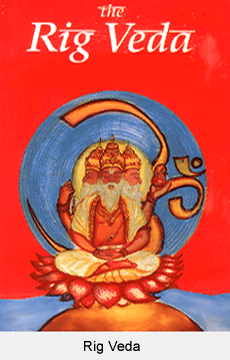 System of administration in Rig Veda depicts the framing of a monarchy which was the earliest form of government in India. A king is bestowed with unlimited powers but is also subjected to control from the common masses. For instance, evil king Vena of the Vairaja dynasty was killed; Trisanku of the solar dynasty was dethroned and in the Little Toy Cart (first century AD) the king was dethroned because of tyranny by a cowherd.
System of administration in Rig Veda depicts the framing of a monarchy which was the earliest form of government in India. A king is bestowed with unlimited powers but is also subjected to control from the common masses. For instance, evil king Vena of the Vairaja dynasty was killed; Trisanku of the solar dynasty was dethroned and in the Little Toy Cart (first century AD) the king was dethroned because of tyranny by a cowherd.
Duties of the King
The king is expected to act with justice, reprimand foreign foes and behave with leniency with the Brahmins from whom he is to take guidance about administration. He is to learn lessons of modesty, justice, policy, metaphysics, and theology. From the other common people, he must study agriculture, commerce and other particulars. He must be a man of good character and after the well being of his subjects. He must be concerned about their protection, happiness and other interests. He must guard against the falsification of measures and weights of essential things in day to day life.
Habits of the King
There are few habits that must be abided by the king. He must wake early and perform sacrifices. There after he must hold court in a decent manner and later dismiss his subjects with generous looks and words. He should hold council in a secret place barred from listeners. Later he should take exercises and bath and thereafter dine in his private apartments. He should also look into other administrative affairs like reviewing of troops, receiving the reports of his emissaries, and other activities.
Capital
The king should build his capital on a fertile land. His fortress is to be well-protected and his palace should be in the centre. It needs to be well-furnished with beautiful surroundings. His queen must be of royal blood. There should be an `Assembly House` in front of his fortress with doors on the north and the south. Fire shall burn continuously and offerings should be offered to this fire. The state guests those who are learned in the sacred lore, should be kept in the Flail. They should be provided with rooms, a couch, meat and drink. Along with these a table with dice should also be provided.
The king must keep strong guards for their protection. The king is considered the executive head and the various departments must be managed by his ministers. The overall management of the kingdom needs to be well executed by the king.
War and Arms
Earlier there were different Aryan kingdoms-Turanian states, Sudra states, Dravidian dominions, and the Nishada territories, i.e. Tibeto-Burman states. These states, though were unequal, were independent, powerful and educated. Each state had a foreign department. This military department was headed by the war minister. Under the Aryan policy, during war or fighting with an enemy, the king was expected to fight hard even if he is alone. Spies were engaged in foreign politics and in cases of war. For any war purpose the army comprised of cavalry, infantry, elephants, and chariots. Bow, arrow, sword, shield, helmet, armour, target, and fire-arms were used in the war.
The king must demonstrate instances of courage to his troops and instil confidence in them though encourage speeches. Troops should be rewarded for their bravery. The laws of war are fair and just. Unequal combat or slaughter is forbidden. Settlements for conquered land were conducted on equally liberal grounds. Also the religion and laws of the country needs to be respected.



















